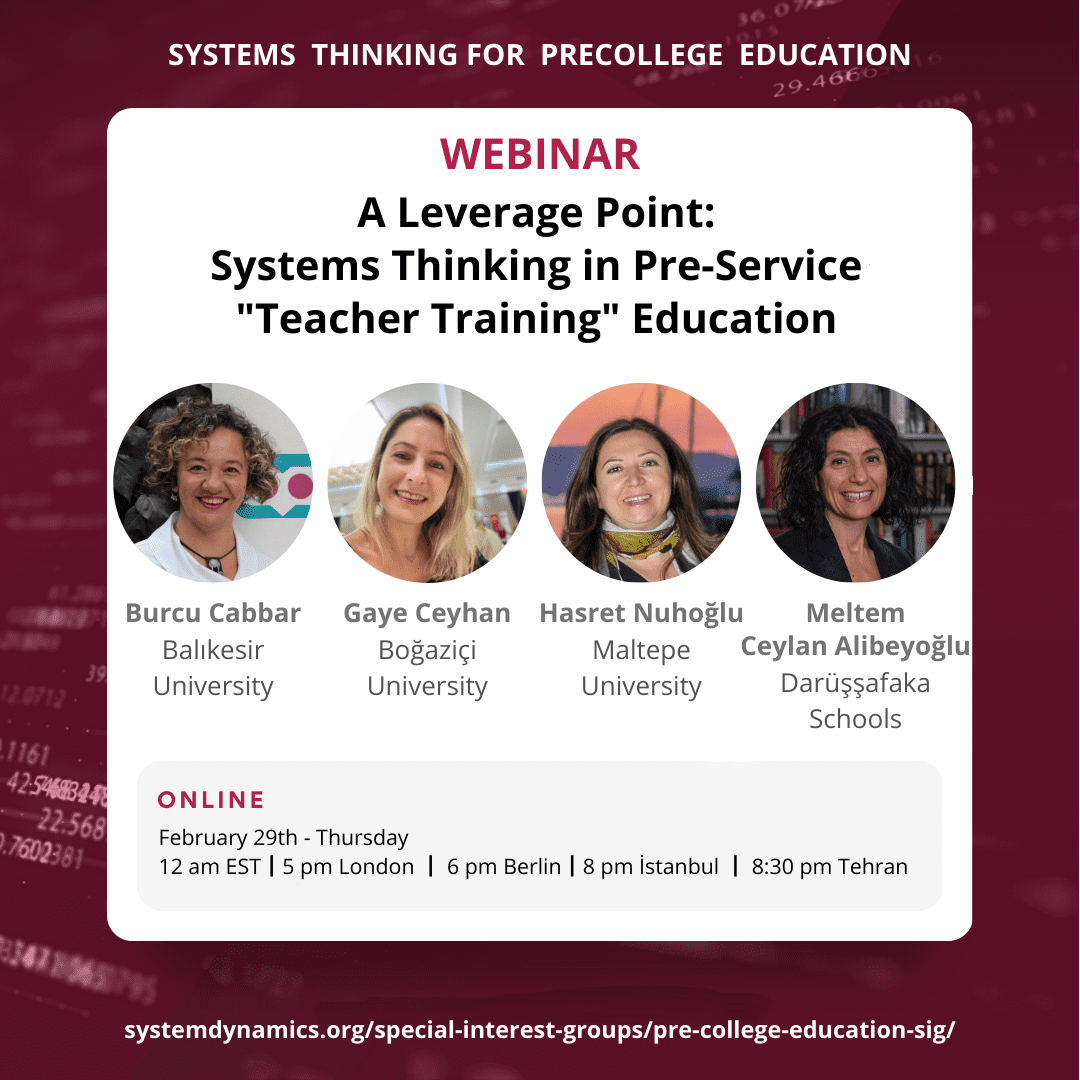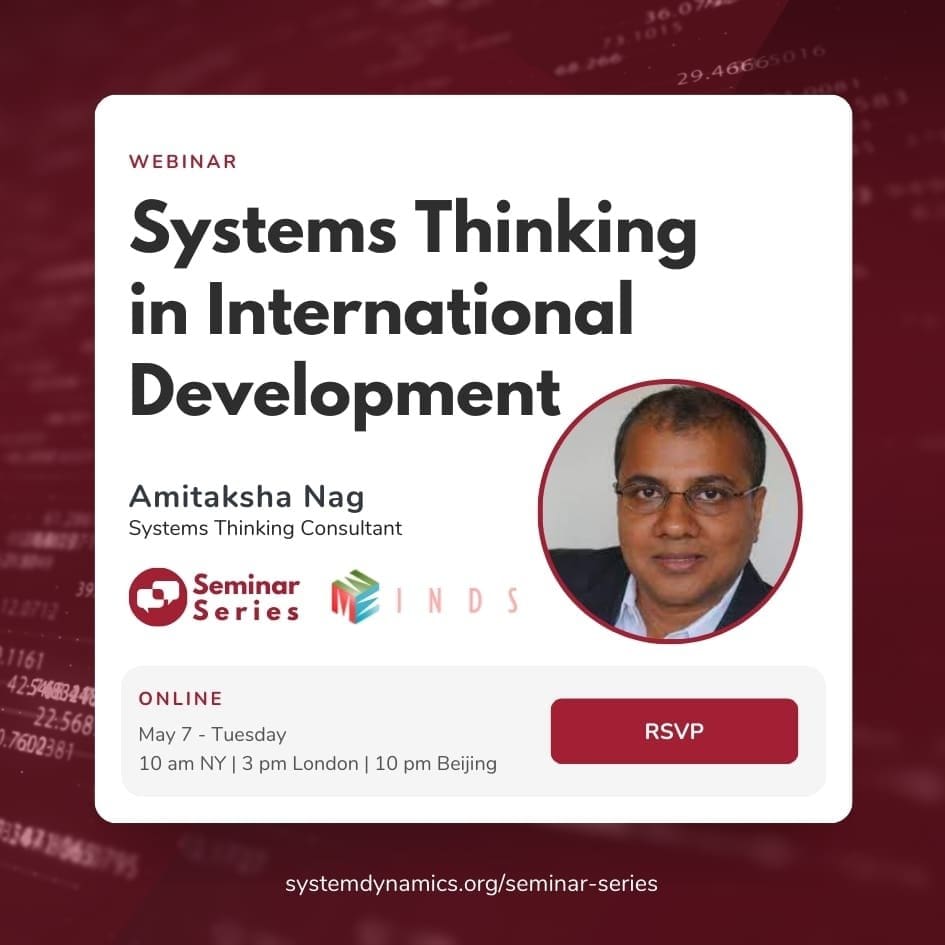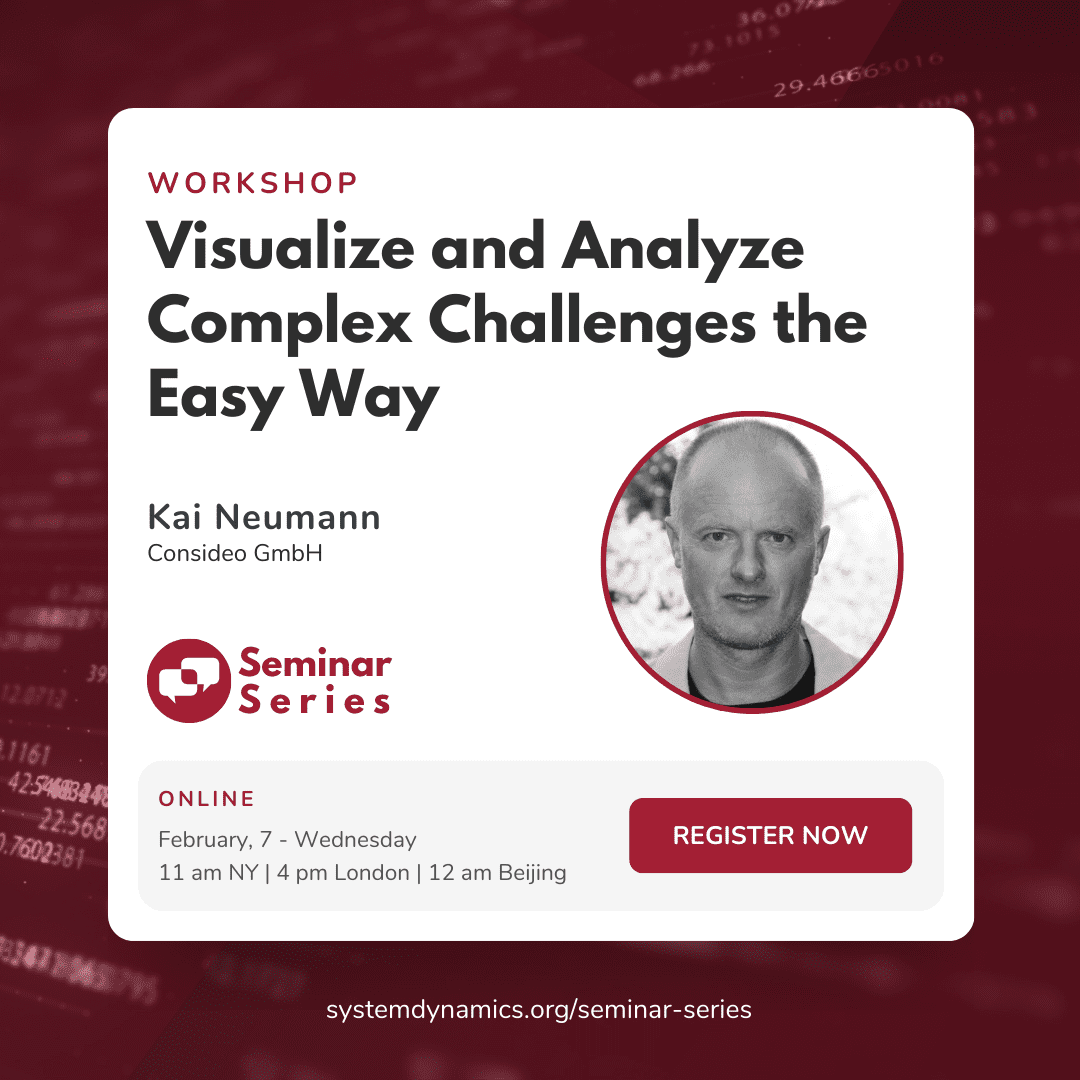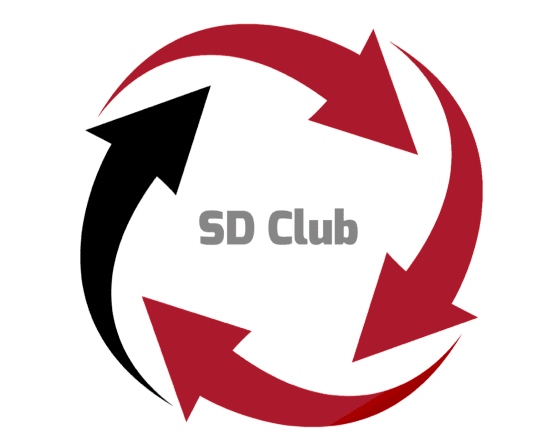A Leverage Point: Systems Thinking in Pre-Service “Teacher Training” Education
Dear Colleagues,
We are excited to invite you to our free webinar entitled ‘A Leverage Point: Systems Thinking in Pre-Service “Teacher Training” Education’ on Thursday, February 29, at 12:00 noon EST.
We consider courses that train pre-service precollege teachers to be one of the most critical places impacting in the formation of system citizens. The professors teaching these courses ultimately determine the criteria for topics and methods to be included within the curriculum and the criteria for student academic success.
The infusion of systems thinking in courses that train pre-service precollege teachers has the potential to be one of the most influential points on Donella Meadows’ list of places to intervene in a system, that is, the purpose of the system.
In this webinar, the experiences gained from the experiments carried out in precollege pre-service teacher training courses in Türkiye since 2019, the work done and plans for the future will be shared and a collaborative discussion environment will ensue where the presenters offer suggestions for those who want to undertake similar projects.
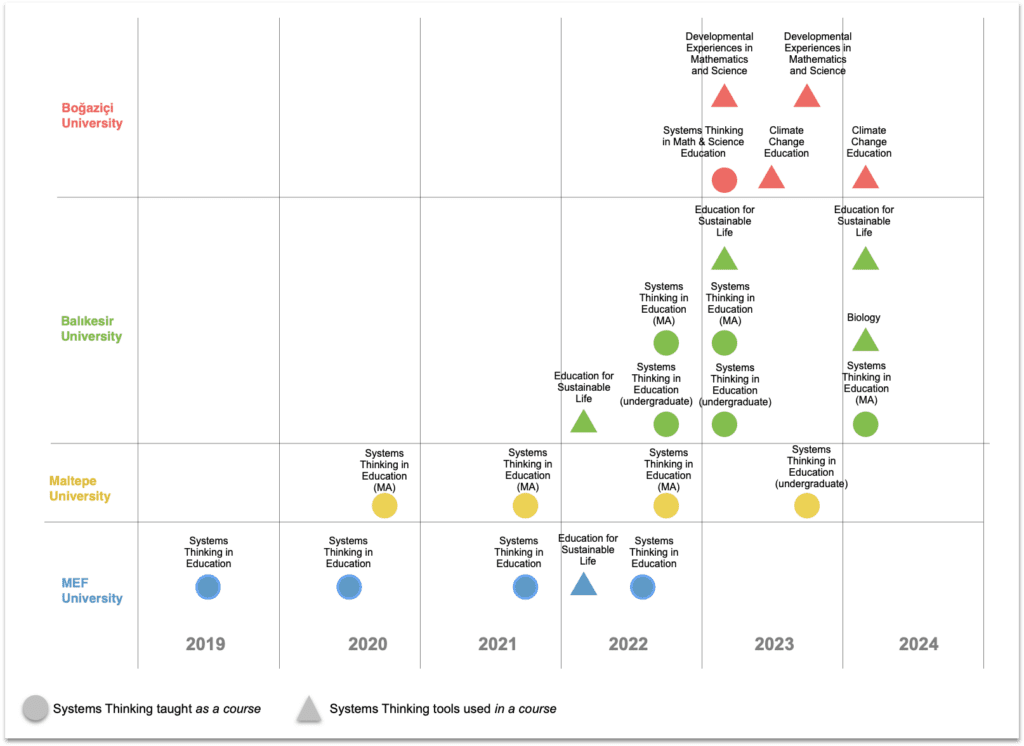 Timeline of courses where systems thinking is/was taught as a separate course (circle) or used as a tool in another course (triangle) by professors of education in Türkiye. Timeline of courses where systems thinking is/was taught as a separate course (circle) or used as a tool in another course (triangle) by professors of education in Türkiye. |
We strongly encourage you to come prepared with questions, contributions, suggestions, and ideas. Your insights will not only enrich the discussions but also provide a platform for collaborative learning and exploration.
We look forward to your active participation in this webinar. Let’s explore the world of systems dynamics together and uncover innovative ways to enhance education.
Best regards – the SIG leadership team.
| Diana Fisher Ülkem Yararbaş Burcu Güngör Cabbar Chang-Kwon (Benjamin) Chung Donald DeLand Ed Gallaher Emre Göktepe Gaye D. Ceyhan |
Matilde (Lin Ya) Hong Meltem C. Alibeyoğlu Prof. Dr. Min-Ren Yan Özgün Kurt Çetinkaya Sena Yıldız Değirmenci Steven Roderick Şebnem F. Gezer |
Dynamic Business Models for Dealing with Competition
March 20 at 11 am NY | 3 pm London | 11 pm Beijing | Time Converter
This seminar is part of our special series System Dynamics for Business Innovation with Kim Warren. A series of nine webinars offering a deep dive into the application of System dynamics in Business. The sessions will explore strategic modeling techniques and their transformative impact across different business domains, from strategic management to IT systems planning and environmental impact. This series will reveal the potential of System Dynamics as a powerful tool for business innovation and complex decision-making.
Session 3
Dynamic Business Models for Dealing with Competition
Overview
This session will introduce participants to the use of dynamic business models (DBMs) for understanding and dealing with competitive challenges and opportunities. The session will explain exactly how competition plays out over time, through three standard mechanisms – mechanisms that are easily explored with quantified diagramming and modeled in detail with digital-twin business models.
Learning Outcomes
- Understand, with a case example, the three standard mechanisms driving the outcomes of competitive interactions.
- Appreciate how dynamic business models enable competitive strategies to be explored, under a range of scenarios.
- Understand the differences in how competition works in different markets and at different stages of a market’s life.
Target Audience
- Business professionals seeking powerful new knowledge in competitive strategy.
- Managers and executives looking to understand and take control of both their general competitive strategy and of specific competitive initiatives.
- Students and academics interested in business strategy and competitive analysis.
This webinar is designed to provide an introduction to dynamic business modeling in the context of business competition, suitable for those beginning to explore these concepts.
Certificate of Attendance
About the Presenter
Kim Warren is an accomplished strategist with a wealth of experience in the business world. He spent 10 years in senior strategy roles, including as Retail Strategy Director at Whitbread PLC. Warren then transitioned to academia, teaching Strategic Management at London Business School for two decades. During his tenure, he developed a keen interest in System Dynamics, finding traditional strategy tools insufficient for modern business challenges. This led him to embrace and adapt System Dynamics, creating the Strategy Dynamics method. Warren’s method focuses on designing and managing business systems dynamically to adapt to changing markets and internal business conditions. He has authored influential books on the subject, including “Competitive Strategy Dynamics” and “Strategic Management Dynamics,” and has been recognized with the prestigious Jay Wright Forrester Award from the International System Dynamics Society, where he also served as president in 2013. Warren, along with his partner Christina Spencer, has developed a range of learning materials and courses to disseminate the Strategy Dynamics method, utilizing the Silico online modeling app to support this approach.
For more detailed information, you can visit his website here.
Up Next
Dynamic Business Models for Strategic Management Accounting
Feb, 28 at 11 am NY | 4 pm London | 12 am Beijing | Time Converter
This seminar is part of our special series System Dynamics for Business Innovation with Kim Warren. A series of nine webinars offering a deep dive into the application of System dynamics in Business. The sessions will explore strategic modeling techniques and their transformative impact across different business domains, from strategic management to IT systems planning and environmental impact. This series will reveal the potential of System Dynamics as a powerful tool for business innovation and complex decision-making.
Session 2
Dynamic Business Models for Strategic Management Accounting
Overview
This session explains the aims of strategic management accounting (SMA) – giving senior leaders insight about how a business develops and performs, beyond just the financials – and the challenges faced by those trying to do so. This seminar will explain that strategic management covers many more responsibilities than simply building the business plan. It will show that Dynamic Business Models can very largely fulfill those needs, in an efficient, reliable and transparent manner. DBMs provide exactly the joined-up view of a business and financials that leaders say they want. (The session is supported by two substantial practitioner articles)
Learning Outcomes
- Understand the aims of strategic management accounting.
- See how DBMs transform the contribution that SMA can offer.
- Learn to integrate dynamic modeling of a business system’s behaviour with the financial outcomes it generates.
Target Audience
- Accountants seeking to upgrade their contribution to organizations’ strategic performance.
- Business strategists and consultants needing to demonstrate both strong business development and financial performance.
- Academic professionals and students in business, accounting, and finance.
- Business professionals wanting to integrate their strategic management efforts and financial outcomes.
This session is designed to provide practical skills and theoretical knowledge, making it valuable for professionals aiming to leverage dynamic modeling in strategic management accounting.
Certificate of Attendance
About the Presenter
Kim Warren is an accomplished strategist with a wealth of experience in the business world. He spent 10 years in senior strategy roles, including as Retail Strategy Director at Whitbread PLC. Warren then transitioned to academia, teaching Strategic Management at London Business School for two decades. During his tenure, he developed a keen interest in System Dynamics, finding traditional strategy tools insufficient for modern business challenges. This led him to embrace and adapt System Dynamics, creating the Strategy Dynamics method. Warren’s method focuses on designing and managing business systems dynamically to adapt to changing markets and internal business conditions. He has authored influential books on the subject, including “Competitive Strategy Dynamics” and “Strategic Management Dynamics,” and has been recognized with the prestigious Jay Wright Forrester Award from the International System Dynamics Society, where he also served as president in 2013. Warren, along with his partner Christina Spencer, has developed a range of learning materials and courses to disseminate the Strategy Dynamics method, utilizing the Silico online modeling app to support this approach.
For more detailed information, you can visit his website here.
Up Next
MINDS Cast Ep. 4 – Systems Thinking Application in International Development w/ Amitaksha Nag
May 7 at 10 am NY | 3 pm London | 10 pm Beijing | Time Converter
In this webinar, Amitaksha will share his insights about application of systems thinking in development projects and policy making. He will focus on conceptualizing systems-level (feedback, accumulations, delays) interactions over project change pathways, and its implication on understanding of success in development interventions. With examples, the presentation will demonstrate how projects deemed successful can produce unfavorable results at the systems-level.
About the Presenter
Amitaksha Nag is a systems change practitioner with over 20 years of experience in facilitating co-learning of complex systems for design and evaluation of international development programs. He has been leading adoption of systems thinking and adaptive approaches in organizations, and trained policy makers, community leaders, change managers, scholars, and students around the world. His interest is in practical and accessible application of systems thinking concepts and tools that improve public participation in policy decisions. Amitaksha innovated the Datamuse platform (www.datamuse.io) that is widely used for mapping networks and mental models of stakeholders that influence change.
Join Zoom Meeting (recommended)
https://uib.zoom.us/j/62870452638?pwd=T1hZU21WSXhYWVJlQzN0SzlkbWRYQT09
Meeting ID: 628 7045 2638
Password: a0Qf9yiS
MINDS Cast Ep. 3 –Escape from Model Land – How Mathematical Models Can Lead Us Astray and What We Can Do About it – w/ Erica Thompson (UCL)
Mathematical models are used to support many kinds of decisions, but they do not produce perfect predictions of the future. Erica will talk about some mathematical and social challenges for the use of models in decision-making, drawing on examples from climate change and Covid, and consider what best practices look like for responsible modeling in politically-charged contexts.
Dr. Erica Thompson holds the position of Associate Professor of Modelling for Decision Making at UCL’s Department of Science, Technology, Engineering and Public Policy, where I work on a programme of research funded by a UKRI Future Leaders Fellowship. She is also a Fellow of the London Mathematical Laboratory, where she leads the research programme on Inference from Models, and a Visiting Senior Fellow at the LSE Data Science Institute.
Her research focuses on leveraging mathematical and computational models to guide decision-making in practical contexts. Dr. Thompson has dedicated her efforts to developing mathematical and statistical techniques for assessing and interpreting models. Additionally, she explores essential philosophical inquiries concerning the true significance of model outputs and the integration of models with expert judgement in decision-making processes.
Don’t miss out this exciting discussion!
Organized by MINDS
This event is organized by MINDS, a student-led peer mentoring initiative for System Dynamics students at the University of Bergen.
Zoom Details:
Topic: MINDS Cast Ep. 3 – Escape from Model Land w/ Erica Thompson (UCL)
Time: Mar 7, 2024 05:00 PM Oslo
https://uib.zoom.us/j/64081308083?pwd=Myt1TDQwSWQzM2pKdXJSWS9HTStSdz09
Meeting ID: 640 8130 8083
Password: 2f9yK9j8
Networking Series: March
Join us to grow your network and build relationships! We’ll host an online networking event for you to get to know people in the field and share your work experience with those keen on System Dynamics. Using the zoom platform you will be able to meet people and share experiences!
You’ll have the chance to really connect! Join us to:
- Get to know people in the field
- Explore different perspectives
- Learn about System Dynamics projects
- Share your experience
- Build relationships
How Did En-ROADS Get 755,000 users? Lessons on Modeling, Interface Design, and Facilitation
May, 8 at 11 am NY | 4 pm London | 11 pm Beijing | Time Converter
How Did En-ROADS Get 755,000 Users? Lessons on Modeling, Interface Design, and Facilitation
In this participatory webinar, Drew Jones of Climate Interactive will share insights on how to create a System Dynamics model and online simulator that will succeed at improving mental models and system performance at scale. The teams at Climate Interactive, MIT Sloan, and Ventana Systems designed its System Dynamics models C-ROADS and En-ROADS with the goal of improving the understanding of climate policy choices amongst decision-makers around the world, leading to deliberate strategies in three major areas: 1) modeling, 2) interface/UX design, and 3) facilitation, workshop design, game creation, training, and user support. This webinar will cover the design decisions made over the ~30 years of the project, generalizing the more universal insights for any system dynamics project.
About the Presenter
Andrew (Drew) Jones is Co-Founder and Co-Director of Climate Interactive. An expert on international climate and energy issues, his quotes and data stories appear in the New York Times, The Washington Post, and other media. Jones and his team at CI and MIT Sloan developed the climate simulations used by John Kerry and others to secure the 2014 bi-lateral U.S.-China deal that set up the Paris Agreement, as well as currently in the White House and Congress. Trained in System Dynamics modeling at Dartmouth College and MIT, Jones has worked at Rocky Mountain Institute and was a protégé of Dana Meadows. Jones co-accepted the System Dynamics Society’s award for the best real-world application of modeling. He won Dartmouth College’s Ray W. Smith award for the most significant contribution to the status of the College.
Special Guests
John D. Sterman is the Jay W. Forrester Professor of Management at the MIT Sloan School of Management and Director of MIT’s System Dynamics Group. He is the author of many scholarly and popular articles on the challenges and opportunities facing organizations today, including the book Modeling for Organizational Learning, and the award-winning textbook Business Dynamics. Prof. Sterman’s research centers on improving decision making in complex systems, focusing on environmental sustainability, climate change, alternative fuel vehicles and process improvement in organizations. He pioneered the development of “management flight simulators” of corporate and economic systems, many of which, including the C-ROADS interactive climate policy simulation he helped developed, are used around the world by governments, businesses, universities and the public. Among his honors, Sterman is the recipient of an honorary doctorate, has twice been awarded the Jay W. Forrester Prize for the best published work in system dynamics, received the best application award from the System Dynamics Society, was named one of MIT Sloan’s “Outstanding Faculty” by the BusinessWeek Guide to the Best Business Schools, and has received seven awards for teaching excellence from the students at MIT.
Florian Kapmeier is Professor of Strategy at ESB Business School at Reutlingen University, Germany. He received his doctorate from the University of Stuttgart on “Interorganizational Learning in Learning Alliances”. He has strengthened his academic profile with research visits at MIT Sloan School of Management (Cambridge, USA), McGill University (Montréal, Canada), University of Lugano (Switzerland), and Emlyon Business School (Lyon, France). For his research and teaching activities, he links the System Dynamics methodology with empirical research on theory development and testing, focusing on organizational aspects of the understanding of complexity, increasingly addressing environmental sustainability issues. He works closely with the Climate Interactive to raise awareness of the consequences of climate change, using the suite of Climate Interactive’s simulation models. Florian has collaborated closely with Climate Interactive to develop the En-ROADS Climate Workshop, the Climate Action Simulation Game, and resources for the World Climate Simulation. In addition, he has helped translate both event materials and website resources for the World Climate Simulation. Florian has facilitated numerous En-ROADS and World Climate events with groups between 12-60+ people since 2014, from high-school and university students to corporate and political policy makers.
Workshop: Visualize and Analyze Complex Challenges the Easy Way
February, 7 at 11 am NY | 4 pm London | 12 am Beijing | Time Converter
Workshop: Visualize and Analyze Complex Challenges the Easy Way
Facing challenges that involve multiple interacting factors requires a methodical approach to visualize and analyze these interconnections. Qualitative modeling provides a straightforward way to map out cause-and-effect relationships. This approach is adaptable, suitable for use in workshops, collaborative models, or individual analysis.
This workshop introduces the user-friendly Consideo iModeler tool to assign weights to connections without the need for complex formulas. Utilizing the Insight Matrix, participants can easily identify key factors that either contribute to or hinder progress towards their objectives.
The session delves into the scientific principles underpinning this qualitative approach, explaining how results are derived. Additionally, it offers a comparative analysis of qualitative and quantitative models, drawing on real-world project examples. This seminar is designed to equip you with the tools to make informed decisions in complex scenarios.
About the Presenter
About Consideo iModeler
Consideo iModeler is a cutting-edge software tool designed to visualize and analyze complex situations, making it easier for users to plan, make decisions, and communicate more effectively. This software stands out for its unique Insight Matrix feature, which provides a revolutionary way to handle complexity. It allows both qualitative and quantitative modeling, including System Dynamics for scenario modeling.
Systems Thinking for Sustainability: A Proposal for International Cooperation
January, 17 at 11 am NY | 4 pm London | 12 am Beijing | Time Converter
Systems Thinking for Sustainability: A Proposal for International Cooperation.
The international cooperation proposal “System Thinking for Sustainability” is an initiative led by the Autonomous University of Bucaramanga (UNAB) whose fundamental objective is to address current challenges in favor of global sustainability. It is based on the application of Systems Thinking, a comprehensive approach that seeks to understand and solve complex problems from a holistic and interconnected perspective.
This proposal focuses on promoting sustainable development through collaboration and promoting innovative solutions. Through the analysis of complex systems and the identification of interdependent relationships, it seeks to find strategies to address contemporary dilemmas in key areas such as energy transition, organizational and institutional change for sustainability, water management, cybersecurity and the promotion of education and scientific vocations.
A look at the problems of dissemination of systems thinking: Recognizing the challenges of effectively disseminating Systems Thinking, the proposal focuses on identifying strategies to overcome dissemination barriers and promote a broader and deeper understanding of this approach, promoting its adoption and application in various areas and sectors.
An organizational proposal for coordination to improve impact: The initiative focuses on establishing an effective organizational structure that facilitates coordination between various actors interested in Systems Thinking. It seeks to enhance the impact of this approach by creating collaborative platforms, knowledge-sharing networks and strategies to promote its practical application in relevant contexts.
Development of educational tools and resources: The creation and dissemination of educational materials and practical tools that allow the understanding and effective application of Systems Thinking are sought. This includes the development of digital resources, methodological guides and training programs to encourage greater adoption and understanding of this approach.
About the Presenter
Welcome (Back) and Networking Session
Please join us online Friday, January 26th 11AM ET (Boston time. Here is a time converter). See the “Join” button at the bottom of this page for the meeting link.
In this Collective Learning Meeting (CLM), WPI System Dynamics, the SDS Economics Special Interest Group (SIG), Psychology and Human Behavior SIG, Environmental SIG, Water SIG and Transboundary Groundwater Resilience (TGR) Network of Networks will co-host a
Welcome (Back) and Networking Session
We will have a round of introductions and then discuss
- Future co-hosted events and SIG sustainability
- International System Dynamics Conference 2024
- Anything else the group wishes
We will not record this session but will take notes and share them. You can view the frequently asked questions (FAQ) from these sessions and more on our website.
If you are interested in presenting your work in a future CLM, please contact Christine Tang (ctang@wpi.edu).
Tentative Schedule
https://wp.wpi.edu/lcsap/events/collective-learning-meetings-clm/
Telephone details: https://mailchi.mp/56da7a870e2d/happy-new-year-wpi-system-dynamics-updates-and-upcoming-events

